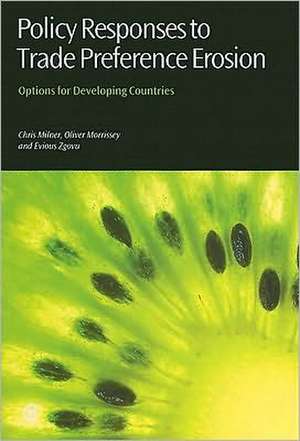Policy Responses to Trade Preference Erosion: Options for Developing Countries
Autor Chris Milner, Oliver Morrissey, Evious Zgovuen Limba Engleză Paperback – 31 aug 2010
Preț: 404.50 lei
Preț vechi: 432.77 lei
-7% Nou
Puncte Express: 607
Preț estimativ în valută:
77.40€ • 80.82$ • 63.91£
77.40€ • 80.82$ • 63.91£
Carte indisponibilă temporar
Doresc să fiu notificat când acest titlu va fi disponibil:
Se trimite...
Preluare comenzi: 021 569.72.76
Specificații
ISBN-13: 9781849290098
ISBN-10: 1849290091
Pagini: 140
Dimensiuni: 163 x 239 x 10 mm
Greutate: 0.34 kg
Editura: COMMONWEALTH SECRETARIAT
ISBN-10: 1849290091
Pagini: 140
Dimensiuni: 163 x 239 x 10 mm
Greutate: 0.34 kg
Editura: COMMONWEALTH SECRETARIAT
Notă biografică
Chris Milner is Professor of International Economics and Research Fellow of the Centre for Research on International Trade and Economic Development (CREDIT) and the Globalisation and Economic Policy (GEP) Research Centre, School of Economics, University of Nottingham. Oliver Morrissey is Professor of Development Economics and Director of the Centre for Research on International Trade and Economic Development (CREDIT), School of Economics, University of Nottingham. Evious Zgovu is a Visiting Research Fellow in the Centre for Research on International Trade and Economic Development (CREDIT), School of Economics, University of Nottingham.
Cuprins
Foreword; Abbreviations; Summary; 1. Introduction; 1.1 Context and issues; 1.2 Aims of the study; 1.3 Outline of the report; 2. Review of Trade Preference Schemes; 2.1 Nature and evolution of preferential schemes; 2.2 Extent and trade coverage of preferential schemes; 2.3 Preference margins: extent and evolution; 2.4 Summary conclusions; 3. Preferences and Developing Country Experience; 3.1 Benefits of preferential trade agreements; 3.2 Benefits of targeted trade preferences; 3.3 Costs of preference erosion; 3.4 Implications of the evidence on costs and benefits; 3.5 Summary conclusions; 4. Future Prospects and Policy Options; 4.1 Implications of current trade negotiations for preference erosion; 4.2 Characteristics of countries exposed to preference erosion; 4.3 Improving preference schemes; 4.4 Policy responses in preference-receiving countries; 4.5 Summary and implications; 5. Strategies for Addressing Preference Erosion; 5.1 Trade policy negotiating strategies; 5.2 Trade facilitation and investment strategies; 5.3 Aid for trade and export development; 5.4 Conclusions: some questions answered; Appendix to Chapter 2 (A2); Appendix to Chapter 3 (A3); Annex Tables; Bibliography; Index
